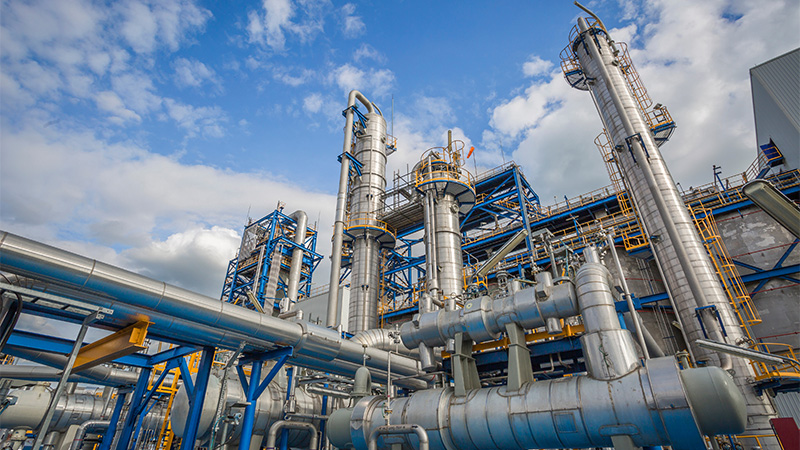Chemical Plants

Use Case 1: As wireless analog output converter
Monitoring of sound noise level that is generated from factory.
Challenge
- Monitor of sound noise level at each place, and communicate to DCS by wireless.
Solution
- The sound level meter has analog output and indicates the noise level as DC voltage.
- The DC voltage output is changed to 4-20mA signal by signal conditioner.
- The converted signal is connected to YTA (Temperature Transmitter) input with 5-ohm load resister, and YTA can receive 20 -100mV DC voltage that is proportional to sound level.
- The noise level data is sent to the DCS and can be monitored.
- Repeater is installed on the top of the building located around the center of the factory.
Benefits of ISA 100 to Industry
- Flexible monitoring points in the plant.
- Eliminate wiring and maintenance costs.
- Robust communication and low Packet Error Rate (PER).
Use Case 2: Monitoring of Chemical Reactor
Temperature and Pressure monitoring of chemical reactor
Challenge
- The monitor points are on the reactor tower.
Solution
- Wireless Monitoring
- Gateway x1, Temperature Transmitter (YTA)x3, Pressure Transmitter (EJX) x1, Repeater x1
- Gateway is installed at control room, and 3m height extended antenna is set.
Benefits of ISA 100® to Industry
- Eliminate wiring and maintenance costs
- Robust communication and low Packet Error Rate (PER) 0 to 6%
Use Case 3: Temperature and Pressure Monitoring
Challenge
- Long distance wireless communication.
- There are many building at this field.
Solution
- Temperature Transmitter (YTA) and Pressure Transmitter (EJX) are installed at each monitoring point.
- Repeater is installed on high position.
Benefits of ISA 100® to Industry
- Eliminate wiring and maintenance costs
- Robust communication and low Packet Error Rate (PER) 0%
Use Case 4: Test the wireless communication quality at high position
Challenge
- The position of Transmitters are very high (30m to 40m).
Solution
- Repeater is installed on the top of 30m height tower.
- 2 Temperature Transmitters (YTA) are installed on the 5th and 7th floor of another tower.
- The distance of Gateway to Repeater and Repeater to YTA are approximate 200m.
Benefits of ISA 100® to Industry
- Established high quality communication with Packet Error Rate (PER) 0% to 3%
Use Case 5: Temperature monitoring at a tank farm
Temperature monitoring of a tank farm that is about 400 m away from the office. Many vehicles and lorries pass or park on the road between the office and the tank farm.
Challenge
- Vehicles and lorries become obstacles to the radio path, making wireless communication unstable.
Solution
- Wireless temperature measurement
- GWX1, transmitter (YTA) x1, repeater x2
- The 2 repeaters are for redundancy
- Extended antenna to circumvent obstacles and improve the radio path for stable measurement (communication was unstable when the height of the antenna was low).
Benefits of ISA 100® to Industry
- Longer communication range.
- Robust communication with lower packet error rates.
Use Case 6: Long distance communication test
How much length reaches the wireless communication.
Challenge
- There are many metal bridges on the road.
- The radio wave is passed under the bridges.
Solution
- Gateway is installed at high position, and repeater is set under the GW.
- Temperature Transmitter (YTA) is set at 500m, 550m, 600m, 650m, 700m point from Repeater.
Benefits of ISA 100® to Industry
- Packet Error Rate (PER) = 0 to 2%.
- RSSI = -86dBm to -94dBm
- Though the distance is 700m, Packet Error Rate (PER) is 1 to 2 %.
- Good quality communication.
- Longer communication distance.
- High sensitivity receiver realize stable and robust communication network under obstacles.
Speak with the ISA100 Wireless Experts
Purpose-built by the industry for the industry to meet end users’ requirements and future-proof investments. ISA100 Wireless simplifies wireless operations, improves plant performance, and reduces your operational costs.